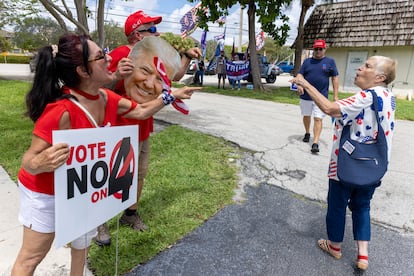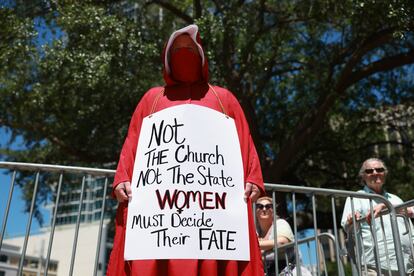DeSantis’s desperate attempts to torpedo abortion protections at the polls in Florida
State residents collected enough signatures to put an amendment guaranteeing the right to terminate pregnancy on the November ballot

The police knock on your door. They’re investigating a possible case of fraud, they say. “Did you really sign a petition to get Amendment 4 on the ballot in November?”
Such incidents have taken place across numerous Florida counties in recent weeks, according to testimonies published by local media and posted to social media. They are part of Republican Governor Ron DeSantis’ desperate campaign against abortion rights. Such coordinated efforts are aimed at derailing a ballot initiative that would overturn a current restriction that makes having the procedure illegal, with no real exceptions, after the sixth week of pregnancy — a cut-off before many women even know that they are pregnant. DeSantis himself signed off on the restriction last year after the Supreme Court overturned the federal right to abortion. If Amendment 4 receives at least 60% of votes, abortion rights will be protected by the state constitution.
Legislation known as the Heartbeat Protection Act was approved by the Republican-controlled state Congress in April 2023 by a vote of 70-40, and went into effect on May 1 of this year. It’s one of the most restrictive of such laws in the country, where the legal precedent that guaranteed national access to abortion, Roe vs. Wade, was overturned by the Supreme Court in 2022. States now have the power to legislate the issue. The Heartbeat Protection Act — which has become one of DeSantis’s primary crusades — only allows abortion before the sixth week of pregnancy and then, only if there is proof and documentation to demonstrate that the pregnancy was due to rape, incest or human trafficking. Or, if it puts the mother’s health in danger, though two doctors are required to certify this. Even in that case, medical professionals who sign off fear that they could face criminal action. In practice, today, there is no realistic means to legally carry out an abortion in Florida.
The severity of the law sparked spirited opposition, even back when it just a proposal. When it was approved, the organization Floridians Protecting Freedom began a sweeping campaign to collect signatures that would put Amendment 4 on the ballot for the November 2024 elections. After long months, they managed to collect one million signatures, 100,000 more than the number the state requires to get an initiative on the ballot. The signatures were checked over the course of eight months by an independent entity and again by the state’s electoral authorities. In April, they were finally accepted and ratified by the state’s Supreme Court, which is closely linked to DeSantis, who appointed five of its seven judges.

The Amendment 4 constitutional reform proposal that will be presented to voters establishes the following: “No law shall prohibit, penalize, delay, or restrict abortion before viability or when necessary to protect the patient’s health, as determined by the patient’s healthcare provider. This amendment does not change the Legislature’s constitutional authority to require notification to a parent or guardian before a minor has an abortion.”
Since the court’s approval of its signatures was announced, Floridians Protecting Freedom and its ally organization have been campaigning in favor of Amendment 4. They raised $12 million in two months, according to their reports, and have been ceaselessly knocking on doors and educating voters, says spokesperson Lisa Zayas. “We are speaking with people about the risks of the ban, because we’re already seeing many women who are being denied when they are most in need… And we’re seeing that the majority of the public supports us. This is a non-partisan initiative, that has widespread support among Floridians.” Recent polls find that support for the right to abort and the amendment is between 55% and 69% of the state’s voters, suggesting that the initiative will achieve the majority it needs to become law.

Amid this panorama, at the end of August, the executive and legislative branches of the Florida government began a series of actions attacking the amendment from different flanks. On August 21, the state’s Supreme Court approved a financial impact statement that will be published alongside the amendment’s text on ballots. That statement, which is substantially longer than the amendment itself, states the following: “The proposed amendment would result in significantly more abortions and fewer live births per year in Florida. The increase in abortions could be even greater if the amendment invalidates laws requiring parental consent before minors undergo abortions and those ensuring only licensed physicians perform abortions. There is also uncertainty about whether the amendment will require the state to subsidize abortions with public funds. Litigation to resolve those and other uncertainties will result in additional costs to the state government and state courts that will negatively impact the state budget. An increase in abortions may negatively affect the growth of state and local revenues over time. Because the fiscal impact of increased abortions on state and local revenues and costs cannot be estimated with precision, the total impact of the proposed amendment is indeterminate.”
Lauren Brenzel, who is the director of the Amendment 4 campaign, accused the authors of the financial impact statement of seeking to sow confusion and obscure the real issue that is under consideration. “Our campaign worked hard to ensure that the language of our initiative met constitutional standards and the state should meet those same standards for clarity and accuracy so voters are not misled. Any financial impact statement should be lawfully accurate, unambiguous, straightforward, clear, and transparent. This sham of a process is a reminder to Florida voters that politicians are playing dirty tricks to overcomplicate and politicize a simple administrative fix.”
DeSantis’s next step was creating a website on behalf of the Florida Agency for Health Care Administration that openly opposes Amendment 4. State law prohibits the government from using its authority and funds to influence an election or vote of its citizenry. When questioned about the website, which alleges that the amendment puts women’s health in danger, DeSantis went on the defensive. “It is not electioneering. It’s things that can absolutely be done through these public service announcements. And I’m glad they’re doing it.”
Still not satisfied, the Florida State Department — which is also closely tied to the governor — announced that some 37,000 of the signatures that had been verified weeks prior were suspected of fraud. DeSantis has said that they are investigating petitions that were submitted “on behalf of dead people.” That is when they started to make home visits to confirm signatures, despite the fact that they had already been validated and the window to question signatures had long passed. As such, the objective of the visits is not clear, since it seems legally improbable that they will be able to get the amendment taken off the ballot at this point.

Lisa Zayas and the rest of the team behind the amendment sees these efforts as an intimidation campaign designed to torpedo the democratic process, but are undeterred in their mission. “Obviously, these actions and the spread of disinformation is pathetic and dramatic […] but we are firm in that what we see in all our studies, all our information, that the majority of citizens support this. We will continue educating to consolidate that support because we know we can do this,” says Zayas. However, on September 13, Floridians Protecting Freedom and the ACLU of Florida filed a lawsuit against the “illegal use of public funds” to campaign against Amendment 4.
Beyond the official campaign, the government’s tactics have generated multiple legal actions in response, and the Supreme Court recently permitted the fast-tracking of a case against Governor DeSantis and other officials who are accused of inappropriately using their power. The lawsuit asks for a ban on the misuse or abuse of their positions and agencies to interfere with the Amendment 4 election. Rather than dismiss the petition, judges have requested that defendants respond to its concerns by the afternoon of September 23.

All this could have a greater electoral impact on local elections, as well as those for the U.S. House of Representatives, Senate, and even the presidential race. Republican presidential candidate Donald Trump is a Florida resident and may vote for Amendment 4. In recent weeks, he has been asked on multiple occasions about his position on the issue, and his responses have been erratic. First, he said that he did not support the six-week ban, and then retracted the statement a few days later. It’s not clear whether he will vote for or against the ballot initiative, nor the effect that could have on Florida and national elections.
Since Trump’s political rise, Florida has become a state with a clear Republican majority after years of being one of the country’s key political battlefields. Still, every time abortion rights have been the subject of a referendum, from the 2022 Supreme Court decision to the referendums in conservative and progressive states, the majority of voters have backed them. Throughout this presidential campaign, abortion has been one of the major issues of the Democratic candidate, Kamala Harris. So far, no one has dared to say it out loud, and polls suggest that it is highly unlikely, but in the middle of a ferocious battle that has placed the issue at the center of its debate, abortion could perhaps make Florida a swing state once again.
Translation by Caitlin Donohue.
Sign up for our weekly newsletter to get more English-language news coverage from EL PAÍS USA Edition
Tu suscripción se está usando en otro dispositivo
¿Quieres añadir otro usuario a tu suscripción?
Si continúas leyendo en este dispositivo, no se podrá leer en el otro.
FlechaTu suscripción se está usando en otro dispositivo y solo puedes acceder a EL PAÍS desde un dispositivo a la vez.
Si quieres compartir tu cuenta, cambia tu suscripción a la modalidad Premium, así podrás añadir otro usuario. Cada uno accederá con su propia cuenta de email, lo que os permitirá personalizar vuestra experiencia en EL PAÍS.
¿Tienes una suscripción de empresa? Accede aquí para contratar más cuentas.
En el caso de no saber quién está usando tu cuenta, te recomendamos cambiar tu contraseña aquí.
Si decides continuar compartiendo tu cuenta, este mensaje se mostrará en tu dispositivo y en el de la otra persona que está usando tu cuenta de forma indefinida, afectando a tu experiencia de lectura. Puedes consultar aquí los términos y condiciones de la suscripción digital.









































